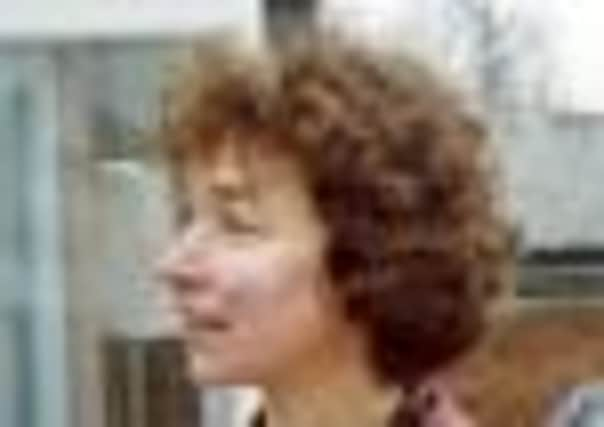Obituary: Susan Manning, professor of English Literature


Susan Manning was an intellectual dynamo whose love of words generated an influence that extended around the world.
As Grierson Professor of English Literature and director of the Institute for Advanced Studies in the Humanities (IASH) at Edinburgh University, her contribution was huge, but beyond that, she was known internationally through her work on transatlantic literature, the Scottish Enlightenment and with the Confucius Institute.
Advertisement
Hide AdAdvertisement
Hide AdAn academic with a rare knack of seamlessly combining her talents as a scholar, manager and mentor, she was a brilliant researcher, inspiring teacher and an excellent administrator and organiser, yet remained humble in success.
The daughter of medical physicist James Valentine and his wife Honora, a philosophy graduate, she was educated at John Mason High School in Abingdon near Oxford, after her parents had moved south when she was nine. As a teenager she excelled in science and humanities, achieving perfect O-level grades in both fields. But she followed her instincts at A-level, deciding to study English. Literature’s gain greatly exceeded science’s loss.
After capping her schooldays with an exceptional final year, in which she became head girl, she took the then unusual step of taking a gap year. She spent time visiting Canada and Paris and Grenoble in France before going up to read English at Newnham College, Cambridge, where she graduated with a BA in 1976, around the same time as marrying physicist Howard Manning.
She then embarked on a PhD on Scottish and American literature, studying in the National Library of Scotland and then winning a Harkness Fellowship, which took her to Charlottesville in Virginia where she studied under distinguished Americanist David Levin. She and Howard went on to have their first child, Laura, in the States. On her return to Cambridge, she took up a research fellowship at Newnham College in 1981, becoming a college lecturer in 1984 and later faculty lecturer.
She also continued her doctorate studies, gaining her PhD in 1986 and joking that it had not taken ten years but three children – with Lindsay and Sophie having completed her family. Remaining at Newnham for the best part of 20 years, she skilfully pursued her career in English along with motherhood; Sophie attended her first college seminar in a carrycot, aged just three weeks.
Following a bout of meningitis, Prof Manning was diagnosed with lupus but, undeterred, continued to live as full a life as possible. Latterly she ignored her lack of circulation to spend three hours snorkelling on Australia’s Great Barrier Reef – an experience that rendered the great wordsmith almost speechless.
In 1999 she moved to Edinburgh to take up the Grierson Chair in English Literature. She also held the directorship of IASH there for seven years, from 2005, having previously been research director and postgraduate director in the School of Literatures, Languages and Cultures.
A serious bowel operation, a lung disease and the ravages of lupus failed to slow her and she made IASH a vibrant centre for multidisciplinary studies. It gave full scope to her administrative genius and range of interdisciplinary skills – and afforded her an international reach.
Advertisement
Hide AdAdvertisement
Hide AdShe was a Fellow of the Royal Society of Edinburgh and the Royal Society of Arts, Manufactures and Commerce, as well as a Trustee of the Kennedy Memorial Trust, which sends scholars to further study in the US, and the Rothschild Fellowships in Jerusalem.
In addition she was a trustee of Edinburgh University Press, and a member of the Gifford Lectureships committee and the research committee of the College of Humanities and Social Sciences. She also served on the advisory board of the Edinburgh Confucius Institute and of several scholarly editions and journals including the Edinburgh edition of the Waverley Novels, the Stirling/South Carolina edition of the Works of James Hogg, and the Cambridge University Press Studies in Romanticism series.
She co-edited a monograph series on transatlantic literary studies and was a board member and past president of the Eighteenth-Century Scottish Studies Society and a board member of the international body, the Consortium of Humanities Centers and Institutes.
Her own research interests were primarily in the Scottish Enlightenment and in Scottish-American literary relations, the subjects of her books The Puritan-Provincial Vision and the transatlantic study Fragments of Union. She co-ordinated the Carnegie-funded STAR (Scotland’s Transatlantic Relations) initiative and convened its seminar and research projects. Along with Dr Nicholas Phillipson she also convened a three-year research project on The Science of Man in Scotland, funded by the Leverhulme Trust, which led to an essay collection on Character, Self and Sociability in the Scottish Enlightenment.
Her monograph on The Poetics of Character: A Transatlantic Literary History will be published posthumously. She completed it in the Old Lobster House, in Lower Burnmouth, near Eyemouth, which she and her husband had recently completed refurbishing.
Her premature death, following a stroke, has been felt keenly around the world by those who admired a woman whose charm, intellect, humanity and generosity left an imprint on countless colleagues and former students.
Prof Manning was buried in woodland on Edinburgh’s Corstorphine Hill after a service full of poems, reminiscence and music, including her beloved Bach cello suites, which she always said straightened out her brain waves.
She is survived by her husband, Dr Howard Manning, their daughters, Laura, Lindsay and Sophie, granddaughter Poppy, her mother Honora, sister Claire and brother John.